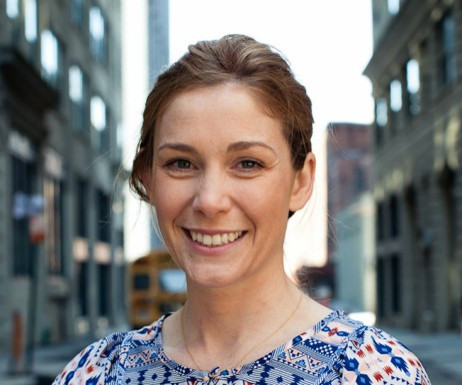New York Web: Loosecubes’ Founder Campbell McKellar Wants You to Work Anywhere You Want, Any Day, Any Time
Column

The only rule at Loosecubes' office in DUMBO is you have to play nice with others. Words to that effect have been etched in Old English on a wooden placard that hangs near the doorway. Pass that lone condition and you're free to use the company's massive studio, a cavernous room with a makeshift meeting area made from a large canvas tent standing on artificial turf, pinned smack dab in the middle of all the desks.
This space, a yawning office near the East River, is the headquarters of the largest office-sharing website in the world, and it cultivates a culture of idea-sharing, creativity and collaboration. It may not be a typical working environment, but then again, is there still such a thing?
Loosecubes founder Campbell McKellar, a brilliant 33-year-old woman in the vanguard New York startup scene, noticed the changing dynamic of workspaces long ago. She herself had worked remotely in Northern Maine for a commercial real estate group. She's a dreamer, a creative type who looks to break the old, dusty traditional models of business. She vehemently believes that sharing ideas is fundamental to personal and professional growth. That's why she started Loosecubes, a website that pairs people looking for a place to work with available space companies would like to rent.
It's a way for companies to provide their employees with a creative benefit and a lifestyle benefit, says McKellar. People that create want to be stimulated by different ideas. Changing your daily environment is one of the best ways to do that.
The concept of coworking wasn't always so clear to McKellar. The epiphanous moment came after she'd removed herself from the bustle of New York City. It was 2009, and she was working in real estate, right in the thick of the financial collapse. Commercial real estate in New York, which typically requires long, exorbitantly priced leasing, was in shambles. Empty cubicles and desks were scattered around the city. That's when McKellar decided to take a break. She convinced her employer to let her work remotely and moved up to Northern Maine with her fiancé. It was during her retreat that the idea for Loosecubes was born.
[I thought to myself] someone must have an art studio or a garage apartment that has WiFi and a landline, and if I can find those people, I'd gladly pay them to work there for a day once a week and just get really productive, says McKellar. And then [I could] come back to the cottage and go for a hike and do [other activities].
McKellar's time spent in Northern Maine was a turning point in her life. She and her fiancé found that they were extremely productive in their new location. She wanted to find a way to sustain the bohemian working lifestyle forever.
When I chose to go to Maine and leave my real estate office, I wasn't leaving my job. I loved my job. I was learning so much at my job, says McKellar. I needed a change of context. Changing my context made me better at my job.
But nothing lasts forever--not even her summer of love, she recalls. Our employers would not let us work remotely forever--so we came back in three months. She reentered the workplace-and devoted nights and weekends to working on Loosecubes.
McKellar reached out to her friends from business school. Several of them had started online businesses, and they coached her through the launch process. During the incubation period, McKellar would wake up at 6 a.m. to consult with an engineer in England via Skype. She'd go to work, come home and keep slogging through the day, trying to build her forward-looking idea, Loosecubes, one that would change the way people work and collaborate. Eventually the site went live. It wasn't perfect, but from day one, anyone, anywhere, could list a space or rent space.
It was really important for me spiritually to allow any location to list because I, personally, wanted to be able to visit a friendly office anywhere I traveled, says McKellar. For me, the genesis of this business was around total location independence and travel.
McKellar's dream of total location independence has nearly been realized. The company is currently listing work spaces in 559 cities and 67 countries around the globe--and it's only growing. Loosecubes is increasing its social network integration to grow virally. Connecting people with the right work environment is only getting easier. Loosecubes, from day one, has been much more than a directory.
It's about connecting people with people, says McKellar. There's no social context, if you're just connecting people with space.
© Copyright IBTimes 2025. All rights reserved.





















